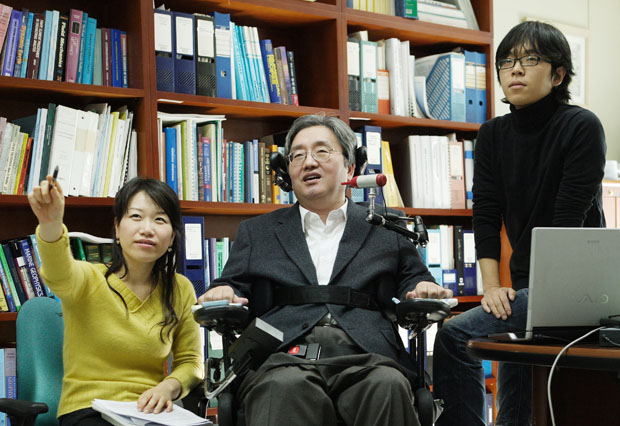
Professor LEE Sang Mook, also known as “Korea’s Steven Hawking”, is leading the way in educating scientists with physical disabilities. The professor currently teaches at Seoul National University’s School of Earth and Environmental Sciences.
Professor Lee introduced a newly created “Calculative science collaboration major” program within the natural sciences department this semester. The professor thought it would be suitable for disabled students to use supercomputers, which will enable them to freely experiment and observe data they were previously obstructed from doing so due to their physical impediments. Calculative science is an academic process that uses simulation to measure natural phenomenon inappropriate for measurement. The method is also used in cultural fields such as digital restoration and special effects for movies as well as in the fields of technology, finance and economics.
Students who have completed their second year can select the Calculative science collaboration major. Opportunities are open to students in the liberal arts department and even to students in the music, art and physical education departments. Six students have selected this course in its opening semester this year and one of the students is disabled.
Professor Lee said, “Although the course was designed for students with disabilities in mind, it is not a course exclusively for them. My wish is that students from the liberal arts department who have an ambivalent fear of computers and mathematics will also participate in the course.”
He compared the course to universal design, which is an architectural concept embracing both able-bodied and disabled people. “When elevators are installed for the use of handicapped people, a thousand normal people use it for every time a handicapped person uses it once. The way I see it, education works in the same way as educational material for disabled students will also be useful for the general student population.” Since last year, Professor Lee has been heading the “Quality of Life Technology QoLT” program, which is currently being funded by the Ministry of Knowledge and Economy. Professor Lee stated “The importance of the software and hardware development business for disabled people is obvious. What is more significantly urgent, however, is the need for humanware development or talent development. I will nurture disabled students from the science departments and transform them into role models so other students with disabilities can look up to them.” According to the Ministry of Education, Science and Technology, 70% of disabled university students major in the liberal arts field.
Last month, SNU commenced various programs to nurture disabled scientists by establishing the Welfare Committee for Disabled People. There are also plans to create a new major in the Fusion Technology Graduate School called “Rehabilitative Science Technology”. Moreover, the 5 disabled person quota have all been allocated to the academic fusion field between the liberal arts and sciences, a field in the College of Liberal Studies.
On July 24, the university is planning to host a 3-day camp which will allow disabled students to participate with students from science high schools and special high schools for the gifted. The camp is aimed to encourage students to enter the field of science.
Professor Lee concluded by saying, “I hope SNU’s ‘Creating Role Models for Disabled Science Department Students’ project is a huge success so that it can work as a catalyst, propelling other universities to follow suit.”
Written by YU Minseok, SNU English Editor, britS@snu.ac.kr ?
Reviewed by Eli Park Sorensen, SNU Professor of Liberal Studies
Proofread by Brett Johnson, SNU English Editor

